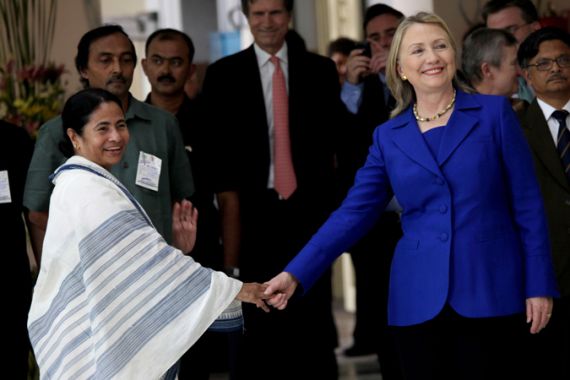Clinton urges India to cut Iran oil imports
US secretary of state says India must find alternate sources, as US continues to pressure Iran over nuclear programme.

Hillary Clinton, the US secretary of state, has urged India to reduce its imports of Iranian oil and to keep up pressure on the Islamic republic regarding its nuclear programme.
Clinton told school children and activists at a town hall meeting in the eastern city of Kolkata on Monday that there was an “adequate supply” of oil from other sources in the market to allow India to find an alternative to Iranian imports.
She noted that India had taken some steps to reduce its imports from Iran, but said that the US wanted to see more.
“If there weren’t an adequate supply … we would understand, but we believe that there is adequate supply,” she said.
India could face US sanctions by the end of June if the Obama administration determines that the South Asian country has not made significant cuts in imports.
The sanctions are part of a US law that is aimed at pressuring Iran on its disputed nuclear programme.
India, with a growth rate of about seven per cent, has a high demand for oil, and any gaps in supply of the commodity will negatively impact economic growth.
The country imports about nine per cent of its oil from Iran, though officials say it has reduced its dependency in recent months. Iran remains its second largest oil supplier, after Saudi Arabia.
“We appreciate what has been done and, of course, we want to keep the pressure on Iran,” Clinton said.
With international sanctions making it difficult to find banks willing to handle Iranian oil payments, India pays for about 45 per cent of its oil purchases in Indian rupees. Iran then uses the Indian currency to import Indian-produced goods.
Clinton said Washington remained focused on putting global pressure on Iran.
“We believe, at this moment in time, the principal threat is a nuclear-armed Iran,” she said. “We need India to be part of the international effort.”
The US is currently determining whether to exempt India from the sanctions, along with European Union nations and Japan, with Clinton saying a decision was still two months away.
Expanding markets
Clinton also met Mamata Banerjee, the chief minister of West Bengal state, who is a key coalition partner and has held up government efforts to lift sanctions on foreign-owned investments in the country.
The two were expected to discuss the entrance of foreign multi-brand retailers such as Wal-Mart into the Indian market.
At the town hall meeting, Clinton said that US nuclear energy companies were also being frozen out of the Indian market by legislation that would impose what they believed were excessive liabilities on them in the case of an accident.
“We’ve made it clear to the government that under the legislation that was passed it would be difficult for US companies to participate,” Clinton said.
“We are still discussing this and we’re hoping there will be a way to work out the remaining kinks in this.”
Clinton will head to Delhi later on Monday, where she is expected to press India to push ahead with its stalled economic reform programme, even though the prime minister’s chief economic adviser said last month that no new reforms were probably before the next election in 2014.
‘Al-Qaeda chief in Pakistan’
Clinton also told the audience in Kolkata that she beleived that Ayman al-Zawahiri, al-Qaeda’s leader, was in neighbouring Pakistan.
India has long accused Pakistan of sponsoring terrorist groups, and Clinton said she would keep up pressure on Islamabad to find other “most wanted” al-Qaeda leaders.
“We want to disable al-Qaeda and we have made a lot of progress in doing that,” Clinton said.
“There are several significant leaders still on the run. Zawahiri, who inherited the leadership from Bin Laden is somewhere, we believe, in Pakistan.”
Zawahiri, an Egyptian physician, was second-in-command under the late Osama bin Laden and was regarded by US intelligence agencies as the chief ideologue for the group.
Clinton also said the US would continue to press for the arrest of the founder of Pakistan-based group Lashkar-e-Taiba, who is wanted over the attacks on Mumbai in 2008.
Last month, Washingtom offered a $10m reward for information leading to the conviction of Hafiz Saeed, who lives openly in Pakistan and has launched a political campaign aimed at ending the Pakistani government’s co-operation with the US.
Clinton also said that she appreciated the sacrifices made by Pakistan, saying that it was the main victim of violence by extremists.